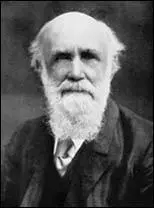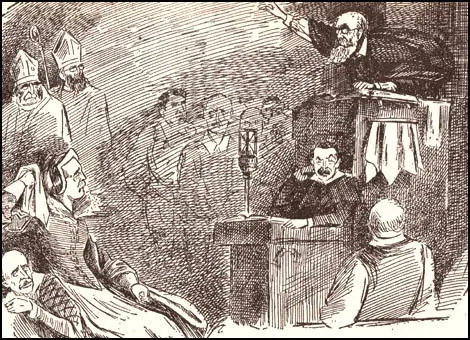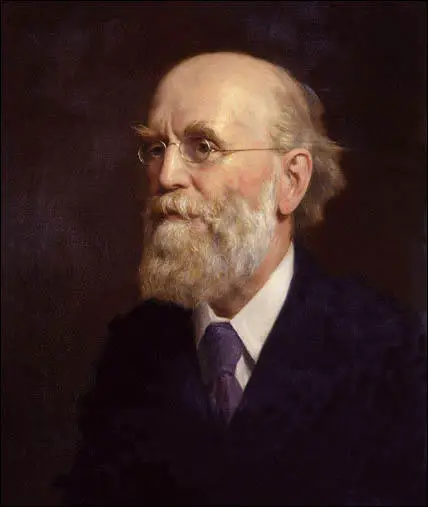John Clifford

John Clifford was born Sawley, a small village near Derby, in 1836. His father worked in a lace-factory and was a follower of the Chartist leader, Thomas Cooper. After a brief education at the local elementary school, at the age of eleven, Clifford began work in a lace-factory. (1)
Clifford had a great love of reading and over the next few years he educated himself and by the time he was sixteen he had risen to the position of book-keeper. His favourite author was Ralph Waldo Emerson who he described as being "‘one of the most potent forces in shaping my life". (2)
In November 1850 Clifford became a Baptist. After two years as a lay preacher in Nottingham, he was recommended by his church to the Midland Baptist College in Leicester, where he began his course in September 1855. "Like many other theological students he questioned the historical truth of Christianity, the teaching of Christ, and the place of miracles in the life of the world." (3)
Praed Street Baptist Church
Clifford was tempted to become a Unitarian but eventually became a minister at the Praed Street Baptist Church in London. At the time the church had just over sixty members, but over the next forty years it increased to over a thousand. Clifford believed that the church existed "not only for our spiritual improvement, but also and specially for saving the souls and bodies of the people in the neighbourhood in which we are located". (4)
John Clifford took his BA in 1861 and BSc in 1862 (with honours in logic, moral philosophy, geology, and palaeontology) at London University. He married Rebecca Carter on 14th January 1862, and they had four sons and two daughters. (5) He continued with his studies and achieved a MA in 1864 and law degree (with honours in the principles of legislation) in 1866. (6)
Clifford was a strong supporter of social reform and self-help. In Paddington he helped establish the Westbourne Park Institute, an institution that provided free adult education, the Mutual Economic Benefit Society, an organisation that provided sickness benefit, the Westbourne Park Permanent Building Society to encourage saving and a Labour Bureau to help those seeking work.
In the 1870s Clifford emerged as the leader of the Baptist Church in England. He held several senior positions including the presidency of the London Baptist Union, National Baptist Union and the Baptist World Alliance. As a religious individualist, Clifford clashed with the other main Baptist leader at the time, Charles H. Spurgeon, who advocated a more conservative approach to religion.
John Clifford and Social Reform
Clifford was a strong supporter of the Liberal Party. In Clifford's view, the politician should always base his policies on "what would further the cause of liberty and equality." He especially admired William Ewart Gladstone, who he believed applied Christian principles to political issues and was therefore a "Christian statesman". (7)
Other causes supported by Clifford included disestablishment of the Church of England, extension of the franchise, repeal of the Contagious Diseases Act, the admission of the atheist Charles Bradlaugh to the House of Commons, Irish Home Rule, the National Union of Women's Suffrage Societies, and the Temperance Society. An advocate of trade unionism, Clifford was a strong supporter of the Matchgirls (1888) and the London Dockers (1889) in their struggles for better pay and working conditions. Clifford alsoplayedaleadingrolein the protests against the way suffragettes were treated in prison. (8)
John Clifford had been a strong supporter of the Liberal Party but he later became a socialist and joined the Fabian Society. The Fabians believed that capitalism had created an unjust and inefficient society. They agreed that the ultimate aim of the group should be to reconstruct "society in accordance with the highest moral possibilities". The Fabians adopted the tactic of trying to convince people by "rational factual socialist argument", rather than the "emotional rhetoric and street brawls" of the Social Democratic Federation. The Fabian group was a "fact-finding and fact-dispensing body" and they produced a series of pamphlets, some written by Clifford, on a wide variety of different social issues. (9)
In 1899 Clifford became a national political figure when he became one of the leaders of the campaign against the Boer War. He was president of the Stop-the-War Committee and a member of the South Africa Conciliation Committee executive. Clifford was a fierce critic of the policy of burning Boer farms and herding women and children into concentration camps. Clifford also opposed the negotiated terms of the Union of South Africa because it did not give equal rights to the country's black population. (10)
1902 Education Act
On 24th March 1902, Arthur Balfour presented to the House of Commons an Education Bill that attempted to overturn the 1870 Education Act that had been brought in by William Gladstone. It had been popular with radicals as they were elected by ratepayers in each district. This enabled nonconformists and socialists to obtain control over local schools.
The new legislation abolished all 2,568 school boards and handed over their duties to local borough or county councils. These new Local Education Authorities (LEAs) were given powers to establish new secondary and technical schools as well as developing the existing system of elementary schools. At the time more than half the elementary pupils in England and Wales. For the first time, as a result of this legislation, church schools were to receive public funds. (11)

Nonconformists and supporters of the Liberal and Labour parties campaigned against the proposed act. David Lloyd George led the campaign in the House of Commons as he resented the idea that Nonconformists contributing to the upkeep of Anglican schools. It was also argued that school boards had introduced more progressive methods of education. "The school boards are to be destroyed because they stand for enlightenment and progress." (12)
John Clifford became the leader of the campaign against the legislation. Clifford was opposed to Balfour's bill for three main reasons: (1) the rate aid was being used to support the teaching of religious views to which some rate-payers were opposed; (2) sectarian schools, supported by public funds, were not under public control; (3) teachers in sectarian schools were subject to religious tests.
Passive Resistance
John Clifford prepared a plan of "Passive Resistance". It was based on the strategy used by John Hampden against Ship Money in 1637 and one of the causes of the English Civil War. "Its tactics were to be those of the old Tithe War: refuse to pay the abhorrent education rate, submit rather to the forced sale of your goods and even of your house; if need be, go to jail!". (13)
Clifford argued that people who disagreed with the proposed Education Act should refuse to pay at least that portion of the rate which was to be spent in or on church schools. The National Passive Resistance Committee was set-up with the motto "No Say. No Pay". However, within weeks the Anti-Martyrdom League was formed to pay the rates that the passive resisters withheld. (14)
In July, 1902, a by-election at Leeds demonstrated what the education controversy was doing to party fortunes, when a Conservative Party majority of over 2,500 was turned into a Liberal majority of over 750. The following month a Baptist came near to capturing Sevenoaks from the Tories and in November, 1902, Orkney and Shetland fell to the Liberals. That month also saw a huge anti-Bill rally held in London, at Alexandra Palace. (15)
Despite the opposition to the new Education Act, it was passed in December, 1902. John Clifford, wrote several pamphlets about the legislation that had a readership that ran into hundreds of thousands. Balfour accused him of being a victim of his own rhetoric: "Distortion and exaggeration are of its very essence. If he has to speak of our pending differences, acute no doubt, but not unprecedented, he must needs compare them to the great Civil War. If he has to describe a deputation of Nonconformist ministers presenting their case to the leader of the House of Commons, nothing less will serve him as a parallel than Luther's appearance before the Diet of Worms." (16)
Rate refusals began in the spring of 1903. "What normally happened was that sufficient of their goods should be distrained and auctioned to defray the rate. It was usually arranged for a friend of the refuser should be on hand to buy back the goods." Over the next four years 170 men went to prison for refusing to pay their school taxes. This included 60 Primitive Methodists, 48 Baptists, 40 Congregationalists and 15 Wesleyan Methodists. John Clifford never went to prison but he appeared in court on 41 different occasions over the next ten years. (17)

The father of Kingsley Martin, was one of those who refused to pay: "Each year father and the other resisters all over the country refused to pay their rates for the upkeep of Church Schools. The passive resistors thought the issue of principle paramount and annually surrendered their goods instead of paying their rates. I well remember how each year one or two of our chairs and a silver teapot and jug were put out on the hall table for the local officers to take away. They were auctioned in the Market Place and brought back to us." (18)
First World War
In the period leading up to the First World War Clifford supported W.T. Stead and his Peace Crusade and condemned the press for its open hostility towards the Germans. However, once war was declared, Clifford supported British participation because of Germany's violation of Belgian neutrality. (19)
Clifford supported the right of the individual to develop their own moral views on the war and was totally opposed to conscription and the punishment of conscientious objectors. Clifford now became a Christian Socialist and in the 1918 General Election Clifford deserted the Liberals and instead supported the Labour Party. Clifford was especially critical of the nationalist speeches made by David Lloyd George during the election campaign.
Clifford retired as pastor of Westbourne Park in 1915. He continued his campaign against the 1902 Education Act and in December 1922, received his fifty-seventh summons to appear before the magistrates for refusing to pay his education rate.
John Clifford died on 20th November, 1923. Since his death historians have accepted that Clifford played an important role in the development of the passive resistance movement. Mahatma Gandhi quoted Clifford as one of the early models of passive resistance and his influence was acknowledged by Martin Luther King, the leader of the civil rights movement in America. (20)
Primary Sources
(1) Kingsley Martin, Father Figures (1966)
My father was involved in the passive resisters' fight against Balfour's Education Act of 1902. Each year father and the other resisters all over the country refused to pay their rates for the upkeep of Church Schools. The passive resistors thought the issue of principle paramount and annually surrendered their goods instead of paying their rates. I well remember how each year one or two of our chairs and a silver teapot and jug were put out on the hall table for the local officers to take away. They were auctioned in the Market Place and brought back to us.
Mother and I were taken for our first motor ride to one of these village auctions where father would explain the nature of passive resistance before the sale began. We drove to a village some fifteen miles away, sometimes travelling at the frightening speed of twenty miles an hour. In those days roads were deep in dust, and you could tell if a car had passed because the hedges were white. I remember three small boys running behind each other pretending to be a motor. The first said he was the driver, the second a car, and the third the smell.
(2) Arthur Balfour, open letter to John Clifford (December, 1902)
Distortion and exaggeration are of its very essence. If he has to speak of our pending differences, acute no doubt, but not unprecedented, he must needs compare them to the great Civil War. If he has to describe a deputation of Nonconformist ministers presenting their case to the leader of the House of Commons, nothing less will serve him as a parallel than Luther's appearance before the Diet of Worms.
(3) David M. Thompson, John Clifford : Oxford Dictionary of National Biography (2004-2014)
Clifford was brought up in the New Connexion of General Baptists, a product of the eighteenth-century evangelical revival centred in the midlands. As a minister in London he became a national leader and was editor of the General Baptist Magazine (1870–84). He was president of the General Baptist Association in 1872 and again in 1891, when the association formally joined with the Baptist Union of Great Britain and Ireland, a moment for which Clifford had worked hard for many years. He was president of the London Baptist Association in 1879, and of the Baptist Union in 1888 and 1899. When the first Baptist World Congress was held in London in 1905, attended by delegates from nearly thirty countries, it was resolved to form the Baptist World Alliance, and Clifford was unanimously elected president. In 1908 he chaired the first European Baptist Congress in Berlin, and in 1911 presided at the second Baptist World Congress in Philadelphia. He spoke at the second European Congress in Stockholm in 1913, and presided over the meeting in London in 1920 to organize assistance for European Baptists who had suffered from the war.
Clifford was open to new directions in theology, while preserving the centrality of the person of Christ. This is seen in books such as The Inspiration and Authority of the Bible (1892), The Christian Certainties (1894), and The Ultimate Problems of Christianity (1906). As vice-president of the Baptist Union in 1887–8 he found himself involved in the down-grade controversy. Spurgeon (a lifelong friend) had accused members of the Baptist Union of abandoning doctrines which he held dear, and resigned from the union. Clifford was involved in the attempts at reconciliation, but was determined to avoid the pressure for a new credal statement as a basis for membership. Instead he drafted a declaratory statement which was approved by the Baptist Union Assembly in 1888.
Student Activities
1832 Reform Act and the House of Lords (Answer Commentary)
The Chartists (Answer Commentary)
Women and the Chartist Movement (Answer Commentary)
Benjamin Disraeli and the 1867 Reform Act (Answer Commentary)
William Gladstone and the 1884 Reform Act (Answer Commentary)
Richard Arkwright and the Factory System (Answer Commentary)
Robert Owen and New Lanark (Answer Commentary)
James Watt and Steam Power (Answer Commentary)
Road Transport and the Industrial Revolution (Answer Commentary)
Canal Mania (Answer Commentary)
Early Development of the Railways (Answer Commentary)
The Domestic System (Answer Commentary)
The Luddites: 1775-1825 (Answer Commentary)
The Plight of the Handloom Weavers (Answer Commentary)
Health Problems in Industrial Towns (Answer Commentary)
Public Health Reform in the 19th century (Answer Commentary)
Walter Tull: Britain's First Black Officer (Answer Commentary)
Football and the First World War (Answer Commentary)
Football on the Western Front (Answer Commentary)
Käthe Kollwitz: German Artist in the First World War (Answer Commentary)
American Artists and the First World War (Answer Commentary)
